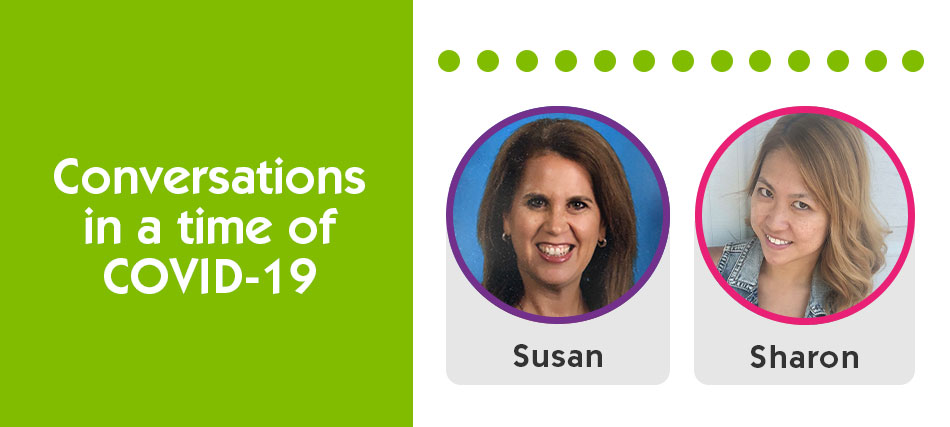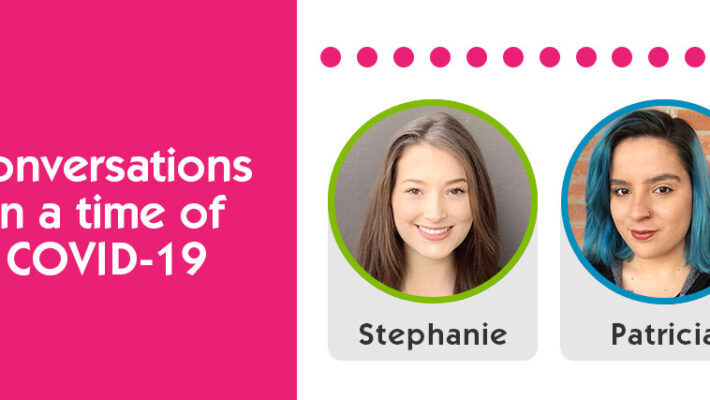This series profiles the experiences of RECEs (and their colleagues) as they navigate the pandemic.
Sharon Looi RECE and Susan Berger OCT (Ontario College of Teachers’ member) work as a team at the York Region District School Board. They’ve worked together for one year.
Q: In what ways has COVID-19 affected your professional role, relationships and practice setting?
Sharon: There are five kindergarten teams at our school. Each week, we connect to share ideas and reflect on what’s working well and what’s not. We use a Google site to connect with the other kindergarten teams. Together, we collaborate on learning activities for the week.
Susan: One of the challenges is helping the parents access the site and showing them how to use it. It’s especially hard to explain over the phone or through an email.
We also have Educational Assistants that we work closely with, particularly about providing activities for children with special needs. Once those are finalized, we post them for the families to access.
Q: Practice, at this time, is about supporting one another and maintaining our health and the health of our families and communities. How are you feeling?
Susan: I’m feeling okay about the situation. I’ve been helping my family as much as I can. Many of them live in the U.S., so we’ve used technology to connect. It’s been tough not being able to visit my family or meet for coffee, especially when they’re feeling isolated. Sharon and I miss seeing each other in person, too. We’re lucky we have a strong working relationship.
Sharon: I’m also feeling okay about things. It’s been hard to physically distance from my family, and is especially hard on my daughter when we visit her grandparents. She can’t physically touch them, and we have to stand far away, say hi and chat. There’s also been a challenge accessing technology – both my daughter and I need the computer, her for school and me for work. We’ve had to create a schedule that didn’t exist before COVID-19. With it being my first year working in kindergarten, Susan has been an amazing support to help me settle in. We’ve been able to continue this strong relationship by having the chance to model collaboration for the children in our class.
Q: What are you finding useful in supporting your physical, mental and emotional health?
Sharon: In terms of my professional practice, I’m lucky that I have a strong teaching partner that I can lean on. I’m grateful for the technology that’s helping me connect with Susan, the families and children in the class, and also with my own family and friends.
Susan: I’m trying to maintain as much of a routine as possible. I make sure to fit in time to exercise in the morning. I’ve also found it helpful to maintain my typical sleep schedule – it’s given me some normalcy.
Q: RECEs are currently practising in new and evolving ways. What are you learning about to support the safety, health and well-being of others in your practice setting?
Susan: We’re working to provide a rich learning environment for kids. What’s nice is that parents are sending in their worksheets to share with us, and we can see how proud they are of what their children are accomplishing. We’ve found that telling parents there’s no pressure to complete the work alleviates their stress. For the children, the focus is on their health and well-being, not on assessment though we can see they’re learning.
Sharon: We’re using Google Classroom, and we sing using the audio function to leave songs for the children. Families have told us how much their kids enjoy hearing our voices, and feel encouraged to engage in the learning prompts we provide. We miss the children very much!
Q: What are some of the challenges you’ve experienced related to building relationships and fostering collaboration in this period of physical distancing?
Sharon: Families that don’t have Internet access may face challenges, though the Board does provide them with technology. However, there’s been one family we haven’t heard anything from, despite us and the administration trying to reach out. We’re worried about them and hope that they’re okay.
Susan: One of the challenges we initially encountered is that some parents who struggle with English have older children who’ve been helping them to communicate with us. As a result, we’re learning more about the ways we can support the unique needs of families and their children.
Q: Can you share a positive story about your experience with navigating new modes of communication or practice?
Susan: It seems like the children can focus longer, perhaps because there are fewer transitions throughout the day. The artwork they’re sharing is so detailed, something we don’t often see in the classroom. It demonstrates the benefit of time, which is perhaps allowing them to focus. We’ve also been really encouraged that families are reaching out to express their gratitude. They’re seeing the investment in their child’s learning can be a positive experience for the whole family.
Sharon: We’re both amazed about how much we’re learning about the children, because we’re more connected to their ‘home life.’ We’ve had the opportunity to build strong connections with families we wouldn’t normally see. I also love seeing the videos the children send. I’m inspired by their learning and amazed at how quickly they’re growing.
Q: Final thoughts?
Sharon: Everything is uncertain right now. We’ve been wondering how the children will be when they return, while also reflecting on how this period has been affecting them. It’s made us wonder how we can adapt our practice in the future. I know that separation anxiety will be a challenge when the children return – they’re so used to spending a lot of time with their families now. Some may feel less safe and secure, and it’s hard to know what their anxiety level will be when they come back to the learning environment.
Susan: We’ve noticed that their learning is taking off. It’s been interesting to see the children developing skills that their families also engage in. Families are always teachers and influencers of their children, but now it’s more evident because of the time they’re spending together. We’re also noticing the children are becoming more like their parents in a sense. They now have a broader community of educators.




